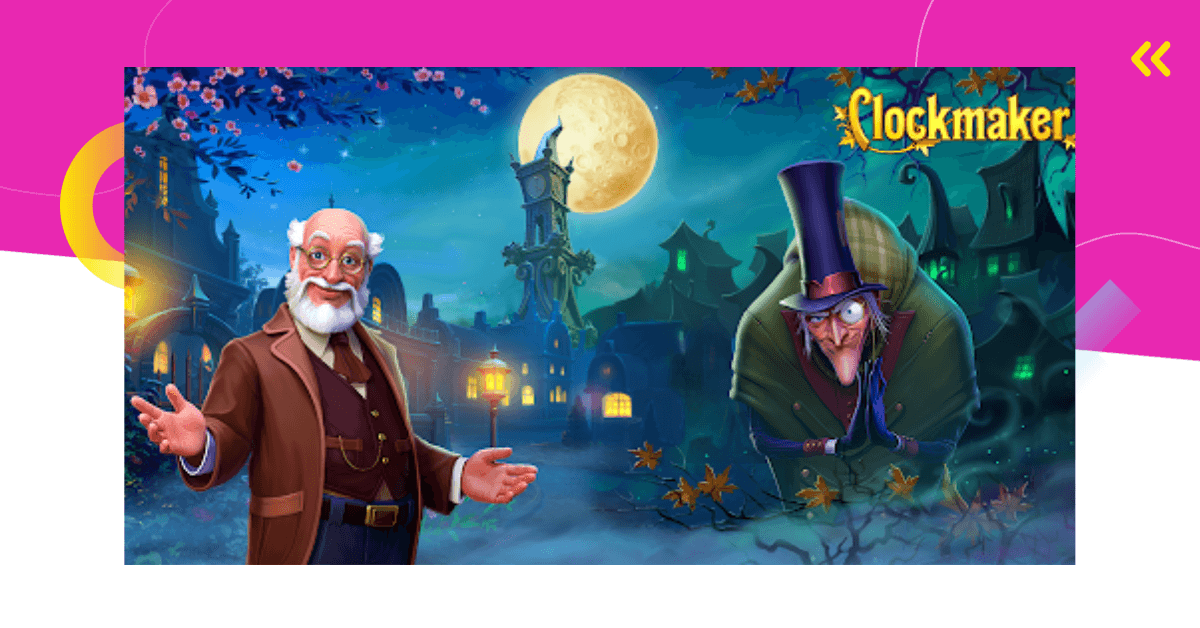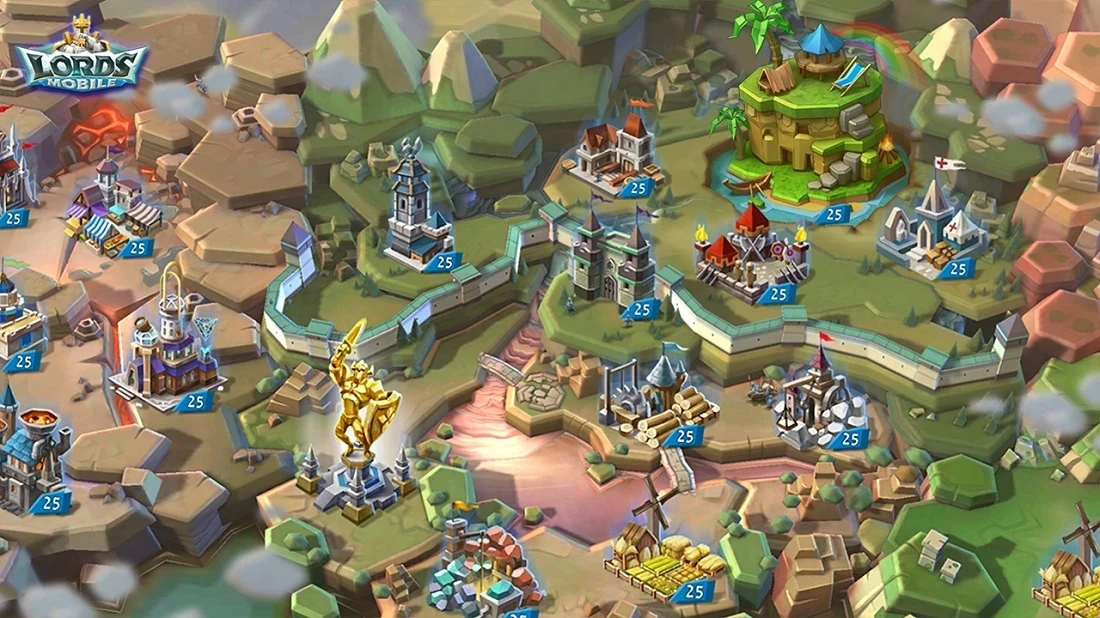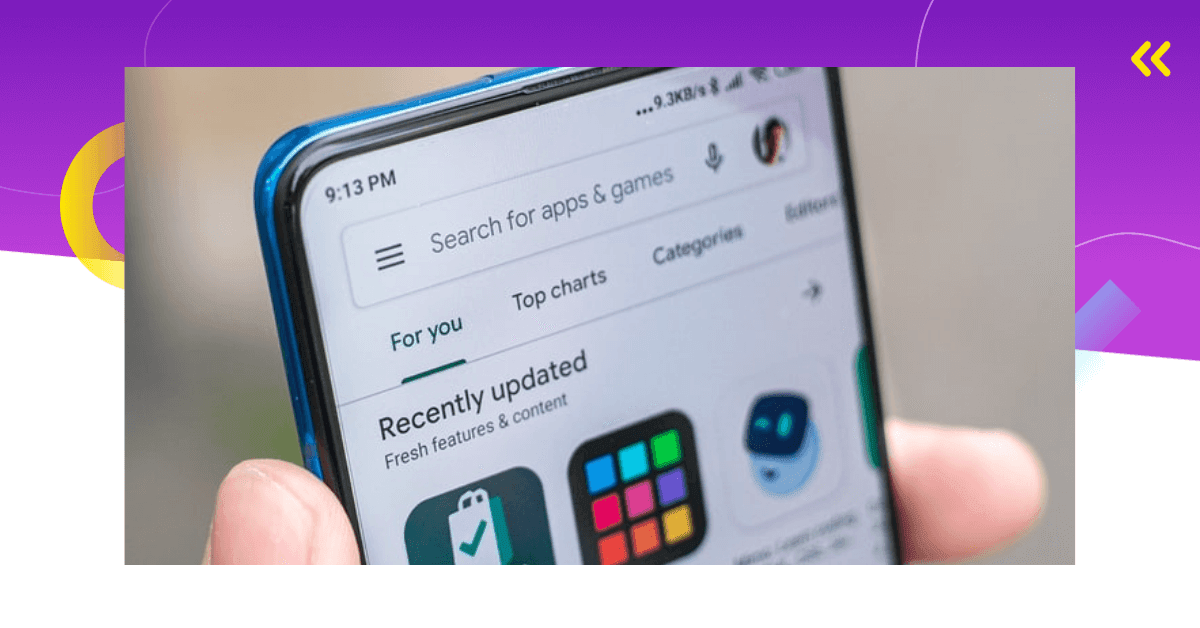Is it possible for a game to become wildly successful six years in?
For Belka Games’ Clockmaker, it is.
In our Clockmaker analysis, I try to uncover how this mobile game managed to pull off such an impressive feat. Hint – its developers came up with a good marketing strategy.
But first, let me tell you what this game is about.
About Clockmaker
In its essence, Clockmaker is a match-3 puzzle game and thus belongs in the puzzle category. However, it has storytelling, adventure, and mystery meta layers.
Match-3 puzzles + different meta layers is a tried and true formula for many casual and puzzle games. You can find it in popular match-3 games like Homescapes and Gardenscapes (storytelling & decoration meta layers), and new games like Project Makeover (fashion, beauty & décor meta layers).
Clockmaker has that old-timey feel and a 19th-century Victorian theme. Furthermore, it’s quite mysterious and has a spooky atmosphere, which ties in well with the game’s storyline. Those themes, as well as the unique storyline, make it stand out among match-3 games.
How Successful Is Clockmaker?
Here’s the thing.
Clockmaker by Belka Games is not a new mobile game. In fact, it has been released a long time ago – back in May 2015. Furthermore, the game hasn’t been particularly successful during the first couple of years of release, especially when it comes to revenue.
However, all of that started to change in late 2019, when Clockmaker’s downloads and revenue started rising. Granted, these metrics are still not as high as those of other games in the genre, but Clockmaker suddenly started doing well.
That’s quite unusual for a mobile game.
If a game doesn’t make a splash and starts earning big bucks in the first few years of release, it usually fails to do so later on. A sudden boost in revenue after four years of release is rare, as it’s the case with Clockmaker.
In many ways, Clockmaker has been like a fine wine, getting better with age.
It was in September 2019 that Clockmaker’s downloads and revenue started growing significantly and are still quite high.
That was also when Clockmaker managed to penetrate the US market in a significant way, as more and more downloads and revenue started coming from this major market. Clockmaker’s advertising strategy also played an important part in the game’s sudden popularity.
Get detailed info on Clockmaker’s downloads and revenue, as well as on other important KPIs, in the section below.
Unless stated otherwise, the data in this article comes AppMagic. Get 3 days of free access to all AppMagic’s features, as well as 10% off, by clicking this link.
Clockmaker Downloads
Following the uptick in late 2019, Clockmaker had many ups and downs. Another significant surge in downloads happened in August 2020, when they reached 900 thousand. In 2022, the game hasn’t been as successful. However, it’s still getting from 100 to 500 thousand monthly downloads.
If we look at all-time downloads, Clockmaker stands at almost 30 million.
Clockmaker Revenue
While Clockmaker’s downloads are all over the place and have gone up and down during the last couple of years, the game’s revenue seems more stable. Overall, this game earned more than $230 million.
From the game’s release all the way up to the beginning of 2021, the revenues have been growing. After that peak in January 2021 that was worth more than $6 million, the revenues have been moving in the opposite direction.
Unfortunately, most games are seeing losses in 2022, both in terms of revenue and downloads. However, the revenues also depend on Clockmaker’s monetization strategy.
Clockmaker Players
When defining a target audience, it’s not enough to simply know people’s age or gender. Developers also need to know the types of gamers who are into their game.
According to GameRefinery, Clockmaker players can be put into three different gamer groups, i.e., player archetypes according to gamer motivations – Thinker, King of the Hill, and Treasure Hunter.
Here’s some info on each one.

Thinker
According to GameRefinery, more than half of Clockmaker players fall into the category of Thinkers – 53% to be exact.
The main motivational driver of Thinkers is escapism, along with problem-solving and thinking, hence the name. Since Clockmaker is a match-3 puzzle game, it’s perfect for Thinkers who want to pass the time by solving tricky puzzles.
Game features Thinkers prefer are puzzle-solving mechanics, monetized timers, the possibility to see other player’s progression, and recurring competitive events. All of which can be found in Clockmaker.
King of the Hill
According to data from GameRefinery, 14% of Clockmaker players fall into the King of the Hill group, another distinct player archetype.
For these gamers, it’s all about achievement, competition, and beating other players. Game features they prefer are an achievement system, the ability to see other player’s progression, leaderboards, and exclusive rewards.

Treasure Hunter
A small percentage of Clockmaker players fall into the Treasure Hunter category. The main motivations for this player archetype are exploration and collecting different items and characters.
Clockmaker Analysis: Advertising Strategy
So far we have established that Clockmaker experienced a sudden growth in downloads, revenue, and other metrics.
For that to happen, Belka Games still had to come up with an effective user acquisition strategy. In this section of our Clockmaker analysis, I dissect Clockmaker’s advertising strategy to further uncover the mystery behind its recent success.
Overall, Clockmaker’s creatives are puzzle-based, as it’s expected for a puzzle game. However, some of the puzzles and mini-games included in ads don’t appear to be a part of actual gameplay. Additionally, certain match-3 puzzles depicted in ads have a different visual style and feel to those I have encountered in the game.
Perhaps Belka Games went with the Playrix strategy where they included mini-games in later parts of the game. But throughout the few days of playing Clockmaker, I haven’t experienced certain themes depicted in ads.
Furthermore, my analysis of top-performing Clockmaker ads will show you that many are in fact inspired by Playrix’s ads. So much so that some Clockmaker ads look identical to Homescapes ads.
But more on that in the section below.
Clockmaker Analysis: Top-Performing Creatives
Clockmaker Ad #1
I wanted to start the analysis of Clockmaker’s creatives with this ad – it’s quite unusual. The creative consists of a single image and a Star Wars intro-inspired text crawl. It’s a message from the developers directly to viewers.
Here’s the beginning of it. “We won’t lie to you. We know you’re tired of seeing boring match-3 ads. Our game doesn’t have any trapped characters or wacky ‘choose the right option’ sections. It doesn’t even have any cheating wives or unfaithful husbands.”
It goes on to explain what the game does have and what makes it unique.
Let’s break this down.
It’s a smart idea to talk directly to the viewers. Furthermore, the casual, honest, and blunt tone of the message makes the developers much more human and relatable to the viewers. That in turn makes the game more appealing – people want something real. Additionally, it stands out from all other match-3 puzzle ads.
But here’s the thing.
Yes, Belka Games was honest in saying their game doesn’t have any trapped characters and similar things we see in match-3 ads. However, they still use those “boring match-3 ads” to advertise their game, as you’ll see in other creatives.
It seems like the purpose of this ad is to be more transparent and avoid misleading the players, while still running misleading ads. It’s basically saying, “We know some of our creatives are misleading. We know you’re tired of seeing them. We’ll continue to run these ads but know that they’re not representative of the game.”
It might have something to do with Playrix’s misleading ads getting banned.
I get the sentiment, but the message would be much stronger if Belka Games stopped running misleading ads.
In any case, it’s a very interesting approach to an ad. It seems that developers have at least started taking into account the players who hate misleading ads, which is a good start.
Clockmaker Ad #2
Seems familiar?
No, this is not one of the notorious Homescapes ads. It’s for Clockmaker, but they’re virtually the same, except that the character is different.
I have done an extensive analysis of Homescapes’ mini-game ads and why they work, you can read it here.
Clockmaker Ad #3
This creative also follows the current trends for match-3 puzzle game ads. Two game characters are trapped and the player needs to solve a puzzle to save them. I don’t even have to mention that this type of puzzle is not featured in the actual game.
Love them or hate them, this type of creatives convert because they appeal to a broader audience of different groups of gamers. Those are puzzle lovers, players who love storytelling, and players who are into adventure games.
Clockmaker Ad #4
It seems to me that the ad above is made specifically for the female portion of Clockmaker’s target audience. That’s a very good strategy considering 71% of Clockmaker players are women.
In short, the ad is about women getting annoyed with their husbands and ending their lives.
Murder, anyone?
There are some women who are annoyed with their messy husbands, which makes this content relatable. Some might even fantasize about getting revenge on their husbands. This ad depicts that murder fantasy some women can relate to.
As you might expect, the ad itself has little to do with the game, except that it features game characters. However, it’s a successful ad because it appeals to the game’s target audience and makes them feel heard.
This is a great example of how important it is to know your audience and show that through creatives.
Clockmaker Ad #5
The creative above is one of the top-performing Clockmaker ads currently. It poses the question – “Do you want to know your brain age?”
The puzzle starts off with a 90-year-old brain. That number gets lower as more matches are made. However, it ends up with a fail.
This ad combines a couple of different ad trends. We have the classic “how smart are you” type content I encounter in many mobile game ads. It’s particularly appealing to gamers who love puzzles and brain teasers – those are the Thinkers I mentioned before.
Furthermore, the ad poses a challenge to the viewer and ends up with a fail, both of which are well-known ad trends.
Why?
It’s quite simple – it makes the viewers think they can do better. That in turn, makes them want to download the game and try it out themselves. It’s a simple, but clever trick.
Clockmaker Ad #6
This type of Clockmaker ad is true to the game, unlike most others. What you see is actual gameplay footage of the match-3 puzzles, with the addition of a pointer hand. Its purpose is to make the ad more immersive.
There’s also a challenge posed to viewers, as we’ve seen in the previous creative. This time it’s “Can you reach level 10”.
At the end, there’s a short animation and a “Play now” call to action button.
Clockmaker Analysis: App Store Optimization
App store optimization is another essential part of a game’s user acquisition strategy. It aids both organic and paid UA.
Let’s see how well Belka Games represents Clockmaker on the app stores.
Game Title
The full name of this game on Google Play is Clockmaker: Match 3 Games! Three in Row Puzzles. On Apple’s App Store, it’s – Clockmaker: Match Three Games.
What Belka Games have done here is include important keywords in the title – “match 3 games”, “three in row puzzles”, and “match three games”. It improves the visibility of the game in app stores.
Game Icon
Above, you can see Clockmaker’s icon for Google Play. It features the main character, Uncle, holding a gem. It’s very on-brand with the game’s theme.
Clockmaker’s icon is different for Apple, you can see it below.
The icon features a broken-looking clock with gems on it, along with the game’s title. It looks quite mysterious but inviting. It makes you want to know what happens in this game.
App Promo Video
The intro in the Clockmaker’s app promo video is quite mysterious and spooky, as is the game. We see an old clock tower that looks haunted.
Then we’re shown the town – the goal of the game is to save the townspeople and renovate the city.
Next, the promo video demonstrates how that goal is achieved. Players need to complete match-3 puzzles in order to get rewards and renovate the city.
At the end, there’s the simple “Play now” call to action.
Images
The images on Clockmaker’s app store pages are nicely designed and do a good job of showcasing the game’s best features. Belka Games is trying to demonstrate the variety Clockmaker has, even though it’s a simple match-3 game.
Furthermore, the features demonstrated appeal to different groups of gamers. For example, we have the match-3 puzzle which attracts casual and puzzle players. Then there’s the before and after image that represents renovation. This feature is important to gamers who love home and décor. And so on.
Clockmaker Analysis: Things You Can Learn From This Game
Let’s finish off our Clockmaker analysis with the main takeaways from the game:
- There’s always the possibility that your game will become a success, no matter how many years have passed since the release
- Investments can breathe new life into a mobile game
- A good user acquisition strategy is essential for the success of any mobile game
- Know your target audience and their motivations for playing
- Create ads according to gamer demographics and motivations
- Try to be more transparent when advertising mobile games
Final Thoughts on Our Clockmaker Analysis
What makes Clockmaker special is the fact that it was brought back from the dead. Very few games experience such success this late in the game.
It shows developers that games that have average or less than average success can be transformed into hit games.
I’m looking forward to seeing what the future has in store for Belka Games and Clockmaker. So far, it looks promising.
For more mobile game analysis, go to our dissections page.












